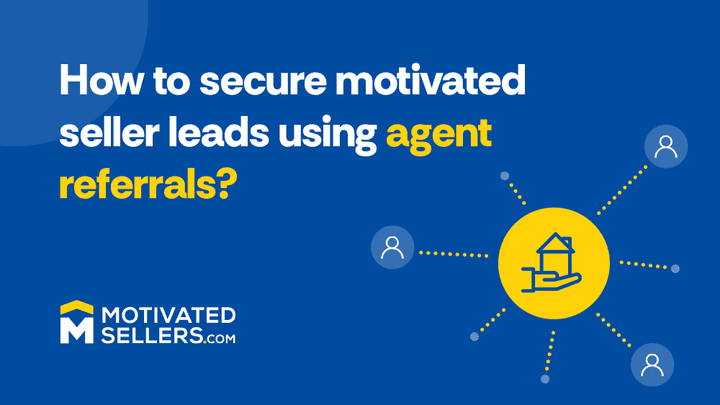

Finding quality leads is the key to growing your business. Traditional methods like cold calling or paid lead services are expensive, time-consuming, and can provide unpredictable results.
There is one more effective lead generation technique: focus on real estate agent referrals. Realtors are in direct contact with homeowners who need to sell fast. These motivated sellers could be looking to sell because of foreclosure, probate, divorce, or financial difficulties.
Maintaining professional relationships with agents can bring you a steady stream of reliable and motivated leads.
Investors can create synergy with agents to achieve shared goals. Think about it: 90% of homeowners listed with an agent in 2024, and 88% of homebuyers were assisted by an agent. These agents are consistently in touch with homeowners facing urgent situations, making them a prime source for motivated seller referrals.
Agents often have early access to homes that haven’t even hit the MLS—whether they’re distressed properties, homes in probate, or those owned by sellers going through divorce or financial hardship.
Many agents hesitate to work with investors because they fear losing commissions. Show them you’re not in direct competition for traditional sales. Focus on how you help distressed sellers avoid foreclosure, bankruptcy, or costly repairs by buying their homes quickly and “as-is.”
Investors evaluate properties differently from agents. Real estate investors focus on the after-repair value, while agents want to maximize the selling price for their clients. You can build referral relationships by specifying your purchase scenarios. You can offer fair prices when a traditional selling approach is not effective. Highlight your flexibility on closing dates and repairs, which makes the process easier for agents and sellers alike.
Example: In Florida, an investor teamed up with an agent who had a client facing pre-foreclosure. The investor closed the deal in under 10 days, saving the seller from foreclosure and allowing the agent to earn a quick commission. The agent referred the investor to multiple other distressed sellers, leading to more deals.
Clearly explain your business model, the types of properties you’re interested in, and your track record. It’s best to meet agents through your local meetup groups, establish credibility, and then reach out to agents within your community.

Real estate agents collaborate with investors in two ways. You can buy properties from the seller’s agent, and you can have the same agent list your properties on the MLS. That’s a dual advantage.
You can also create a formal referral program to provide an incentive to real estate agents. You can promote your referral program through LinkedIn posts, email signatures, or a direct message. Your referral program should mention an incentive and include a professional marketing kit. The marketing package should provide your contact details, property types, business history, and success stories.
You can send a formal email to real estate agents in your area, mentioning your referral program and business services. Fix-and-flip investors can find rehabbing opportunities on MLS. In that case, you should communicate directly with the listing agent. Your offline and digital business presence will attract realtors to your referral program.
After you have secured a few referrals, keep nurturing your established relationships.
Real estate investors talk a lot about finding distressed sellers. Spotting a distressed homeowner is second nature to you, but it might not be obvious for your agent. It’s best to give your partner realtors a cheat sheet:
Keywords to listen for in conversations:
Property signals:
Overgrown lawn, multiple price drops, listings withdrawn after weeks.
Situational triggers:
Probate filings, job relocations, code violations, or liens.
Encourage agents to send you deals that didn’t close, such as expired listings, properties with failed inspections, or sellers who back out after learning about repair costs.
Not all agents will be interested in working with you. You should select 3-5 agents who are investor-minded themselves. They will be more open to exploring this industry with you. Choose agents who are comfortable with creative deals (subject-to, lease options, etc.) and have experience with distressed property sales.
Your business will act as a backup option if the agent cannot sell the house in the retail market.
Start by reaching out to local agents, offering value, and building strong, professional relationships. Over time, as you close more deals and maintain these connections, you’ll become the investor that agents trust and refer when they encounter sellers who need a quick solution.